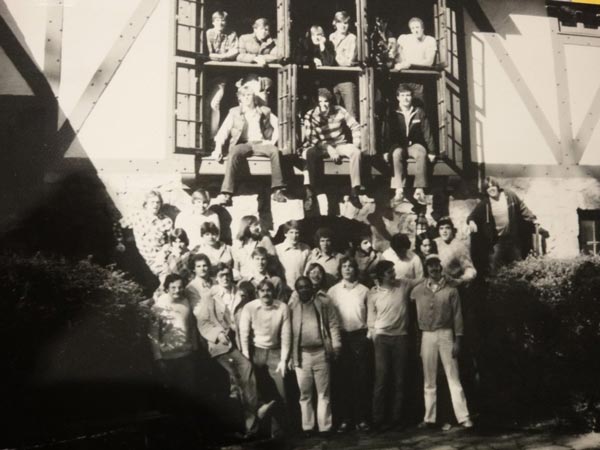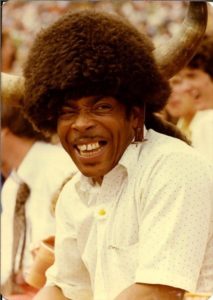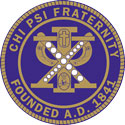The History of Chi Psi
Chi Psi Fraternity was founded at Union College, Schenectady, New York, on May 20, 1841. While it was the eighth Greek-letter society in the country and the fifth to originate at Union, it was the first to be founded upon the fraternal and social principles of a brotherhood, rather than upon the literary interests, which existing societies emphasized. In 1846, Chi Psi was the first fraternity to establish a fraternity house at the University of Michigan. Thanks to the building’s resemblance to a hunting lodge, Chi Psi was nicknamed “The Lodge.” The nickname then spread to other houses of Chi Psi and became a tradition.
The History of Alpha Omicron
Alpha Omicron, first established in April 1860, at the University of Virginia, Charlottesville, Virginia, recently completed its third restart as an Alpha. After two brief lives as an Alpha in the 1860s, Omicron flourished for over a half century, from 1949 to 2008, in a Tudor-style Lodge in an established residential neighborhood several miles from the main Grounds of the University. The Lodge was recolonized in the Spring of 2016 with a robust new group of 33 brothers, recruiting its first pledge class of 11, and moved into a new house in the heart of the fraternity area on Grounds in the Fall of 2016 – the Lodge is now poised for renewed success.
In April 1860, an Alpha of Chi Psi was founded at the University of Virginia. The Alpha was started with nine charter members: graduate students William E. Earle, Y’61, O’60, Robert P. Duncan, Y’58, O’60, William Beattie, Y’58, O’60, and James F. Mister, Γ’60, and undergraduates Andrew J. Arnold, William M. Boyce, Daniel B. Duvall, William M. Gwin, and Benjamin F. Moore. The Alpha’s first life was very brief – the Civil War started shortly thereafter and the Alpha became inactive within a year.
The Alpha was reorganized as Alpha Omicron in 1868, again under the leadership of graduate students – William I. Gibson and George Winston of Alpha Gamma. Other founders included James P. Allen, John E. Beattie, James A. Davison, Edgar H. Farrar, and O. P. Fitz Simmons. The second incarnation of the Alpha proved nearly as short-lived as the first. Correspondence from the Brothers reveals that the Alpha struggled with scant membership, facing stiff competition for “good men” from the numerous secret societies at the University. Echoing a recurring theme at Alpha Omicron, one Brother noted that “of course we prefer going without to taking any other than good men.”

Alpha Omicron was reborn in the fall of 1949. At the time, most of Chi Psi’s Alphas were prospering. The University was targeted as a good location for an Alpha for several reasons: there had been an Alpha there before; the University was academically one of the better schools in the south; and there was a strong contingent of alumni in Virginia and the Washington D.C. area.
The Alpha was distinguished from other fraternities at the University in part by both the location and quality of the house. Unlike the other houses, the Lodge was several miles from the central Grounds. However, this competitive disadvantage was more than offset by its five-acre grounds, architectural amenities, and excellent physical condition.
The house was originally built at the turn of the century as the home of the Charlottesville Country Club, sporting a large, triangular swimming pool, tennis courts, and extensive grounds. The rear of the house overlooked a race track that provided a source of entertainment for the Charlottesville sporting class. The house was later sold to the locally prominent Rothwell family. The Alpha’s Alumni Corporation purchased the house from the Rothwells with the help of Nelson Levings in 1949.
The 1949 refounding benefited from strong alumni support. Marlin “Mac” MacKenzie, the swimming coach at the University, was instrumental. A number of other alumni attending the University’s law school contributed to the effort, including: Frederick Blue M’49; Patrick Graney (who became the first #1 for the new Alpha); George Lauder; Paul O’Brien, A’50; Douglas Payton; Ronald Proctor; Douglas P. Spears, Jr., O’52 and William Young, ΨΔ’44. They helped to conduct the first rush beginning in fall 1949, yielding a first pledge class of fifteen. The first class included: John Barton; Douglass S. Bruce; John H. Davis; Robert Davis; Julian C. Dorman; Wallace B. Goodwin (who who transferred to the University after having pledged at Alpha Theta, and went on to become the national visitor for two years after graduation, succeeding Warren Hoyt); Charles B. Holton; John P. Jennings; Howard B. Johnson; O. Mitchel McCullough; William G. Plummer; Warren K. Salisbury; Eugene B. Schuessler; Arthur W. Sesselberg; and Craig M. Smith.
Known around the University for the first decade after its refounding as the “Yankee Fraternity” because few of its founders or early Brothers hailed from further south than Philadelphia, the Alpha otherwise has mirrored the University’s evolution. In keeping with the era in which it was founded, during which students wore coats and ties to class, the Lodge observed formalities that are hard to imagine today. A grand piano graced the living room. Dinners were served by pledges in starched white jackets on Chi Psi china placed on tables draped with tablecloths and illuminated by candles. Brothers wore ties. Non-resident housemothers, required to attend all parties where women were present, promoted a certain restraint and decorum. These traditions lost currency with the advent of the ’60s and were gradually abandoned.
The Lodge’s physical separation from the University made issues of transportation figure largely in the Alpha’s history. The brotherhood found their first group transportation in a dilapidated 1917 Brockway fire engine purchased in 1951. After the truck ultimately stopped running, it was for several years towed to football games by Brother Stowdard Thompson behind his Ford convertible. More routine group transportation was provided by a Volkswagen bus that ferried the Brothers thrice daily to the University for classes and back to the Lodge for meals.
Transportation became a more serious matter at the end of the 1950s, when University policies on students owning cars nearly caused the Alpha to collapse. In the fall of 1958, the University announced that, due to a shortage of parking space, all cars must be registered, and that only fourth year students would be allowed to drive. Riots by the students drew national press coverage. Although the University ultimately adopted less stringent regulations the following fall, rushees’ concerns that the Lodge would become effectively isolated from the University crippled rush. The Alpha gained only three pledges. This event was coupled with the graduation the following spring of the largest class yet in the Lodge – sixteen Brothers. The following fall found the Alpha with fewer than ten actives. Concluding that they were too few to keep the Lodge financially viable, the Brothers informed the National that they must close.
The National rose to the occasion, pledging financial support for the Alpha, including making the mortgage payments on the Lodge. The National Visitor, Robert Bell, B’58, supervised the 1959 rush, interceding with the University to secure for the Alpha the right to distribute bids to rushees before any of the other fraternities. With this aid, the Alpha struggled back to its feet.
The transportation problems were eased with the donation of a Volkswagen bus by an alumnus. This donation became the first of an unbroken succession of vans that served to shuttle members to and from classes, carry them to football games, and transport rushees and party invitees to the Lodge.
Transportation also figured in the Lodge’s only loss of active Brothers. Until it began to admit women in large numbers in the ‘60s, the University had been a predominantly male school. However, many neighboring colleges and universities had predominantly female student populations. These included: Mary Washington College, in Fredericksburg; Randolph Macon Women’s College in Lynchburg; Longwood College in Farmville; Mary Baldwin College in Staunton; and Sweet Briar College, near Amherst. The Brothers traditionally traveled to the women’s schools in pursuit of romantic interests. It was on one such trip that the Lodge suffered its loss of members. Brothers Bruce Fletcher and Bill Lay made a road trip to Sweet Briar with pledge Phil Brown in fall 1967. On their return, their car swerved from the road into the bordering woods, fatally injuring all. The wreck went undetected for most of the next day; it was suspected that some of them could have been saved if found sooner.

A constant in the life of the Alpha has been the presence of William Hearns and his family. From the Alpha’s refounding in 1949 until 1959, Bill’s grandmother, Mami Currey, cooked for the Brothers. Bill’s wife, Naomi, began helping in 1950, took over from Mamie in 1959, and carried on until 1967. Bill declined repeated job offers from the Alpha beginning in 1950. However, since Bill drove to the Lodge each night to pick up Naomi, the Brothers had countless opportunities to persuade him. He finally succumbed in the fall of 1951.
Bill soon became an irreplaceable part of the Lodge. Unendingly patient with the antics of the Brothers, he lovingly tended to the Lodge, performing minor miracles of restoration after the ravages of parties. He drove the Lodge van nearly continuously since the first one was acquired in 1960, becoming a tradition at a University where tradition is most dearly held.
Recognizing the importance he had assumed in the hearts of the Brothers, he was initiated in 1972, being carried through by the #1, Tom Drinkwater. The Brothers also acknowledged his contributions by holding a 30th anniversary celebration for him in the fall of 1981. It is indicative of the affection he has garnered from the Brothers that the celebration was the single largest gathering of actives and alumni in the Alpha’s history. Over three hundred people attended from as far away as Hawaii. Bill has remained close to the Brothers after he retired from the Lodge. He maintained a 20-year streak from 1995 to 2015 attending Jazz Fest in New Orleans with a variety of Brothers, and has attended home football games with the Lodge for the last 20 years. Tragically, Billy lost his wife, Naomi to a brief illness in 2008. Brother Chuck Lane gave a eulogy on behalf of Omicron at the Rose Hill Baptist Church in Charlottesville. Bill remarried, to Odell Winston, in 2011 at a wedding in Charlottesville attended by over 50 brothers. At Bill’s request, in lieu of gifts Brothers raised funds to enable Bill and Naomi to honeymoon in Hawaii. Bill remains active within his church and community, and plays piano at Martha Jefferson hospital every weekend.
The Lodge and Alpha Omicron came to a crossroads in the spring of 2008. In the face of mounting maintenance costs and continuing recruitment difficulties due to the Lodge’s location, the Board of Directors decided to close the Lodge and enter the Alpha into dormancy. Several meetings were conducted to decide on the best course of action to return the Alpha to active status, and in April 2008 the Board voted unanimously to sell the Lodge with the intention of relocating closer to Grounds. The closing of the Lodge coincided with Billy Hearns’ 80th birthday party, during which 100+ brothers and their dates came to bid farewell to the Trail’s End property.
In the summer of 2011, Board of Directors president Brian Valeyko (O’95) finalized the sale of the Lodge to a UVA alumnus and began the search for a new, Grounds-centric property through which to base a recolonization effort. Initial efforts were complicated by zoning restrictions and a lack of viable pre-existing properties, but ultimately a house located at 167 Chancellor Street was chosen, walking distance from both Grounds and the Corner and one street over from Madison Bowl, the heart of the fraternity district. The property was purchased from owner Walter Slawski, a local businessman, in late 2013. The purchase documents, signed by Board of Directors president Bryan Castle (O’96), included a right of first refusal on the neighboring property at 165 Chancellor St (also owned by Mr. Slawski) until April 2018. Renovations began immediately in preparation for Alpha Omicron’s eventual return to active status, and the first class of brothers moved into the new Lodge in the fall of 2016.
Recolonization efforts began in earnest in the fall of 2014, spearheaded by Corporation president Joe Bailey (O’81) and expansion specialists Max Greene (ΨΔ’14), Steve Habat (Β’12), and Nick Taylor (ΠΔ’14), with strong support from alumni Shawn Brydge (O’00) and Paul Wright (O’82). Referrals for new members were sought out from alumni, student leaders, sororities, and faculty members, with a focus on finding good men worthy of inheriting the Chi Psi legacy. Their rigorous efforts were a success, and Alpha Omicron was rechartered on 7/25/2015 at the 174th National Convention and officially refounded on 11/6/2015.
Alpha Omicron’s fourth refounding class consisted of 33 men, including two legacies – Zach Talbot (son of Scott Talbot (O’81) and Grayson Johnson (son of Frank Johnson (O’73)). Under the watchful eye of #1 Conrad Tindall (O’16), the refounding brothers strove to establish Alpha Omicron’s presence on Grounds its first year back at the University. Despite lacking both widespread name recognition and a finished house to hold events in, Alpha Omicron emerged from its first spring rush with 11 new pledges.
–Zachary B. Talbot O’16; C. Scott Talbot O’81

